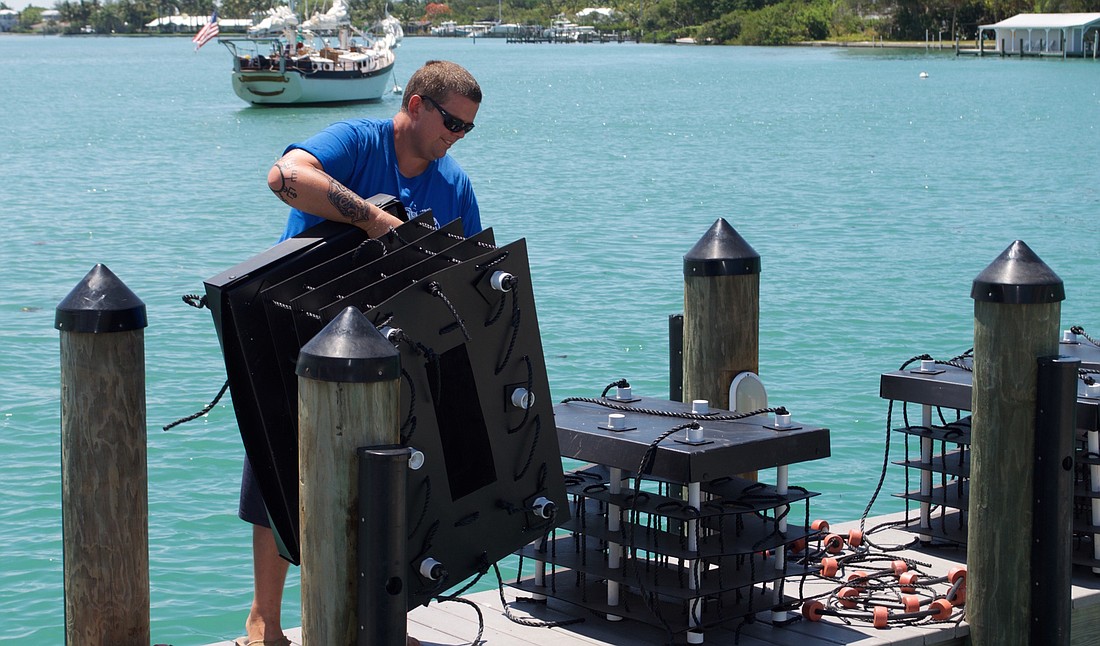- January 29, 2026
-
-
Loading

Loading

The way David Wolff sees it, nothing is bringing back Florida’s mangroves.
Oh, sure, people and groups will replant and restore thickets here and there, but far too many of the shoreline-hugging trees have been chain-sawed or uprooted in the name of development — a batch recently within sight of where Wolff, the executive director of Ocean Habitat Inc., was standing on Friday in Longboat Key.
And it’s those mangrove roots and limbs, now often missing from waterways on which they once thrived, that served as protected habitats for a range of underwater life, from tiny organisms to juvenile game fish and more.
So the former real estate executive decided to do what he could artificially and helped push to further develop and market his non-profit company’s Mini Reef, essentially a passive, underwater nursery. There’s no power or mechanics involved.
“I decided I wanted to do something that didn’t involve a boardroom,’’ said Wolff, who graduated from the University of South Florida with degrees in oceanography and marine biology.
Made of polypropylene, the precisely shaped and sized structures are simply lowered into the water under a dock and provide a surface on which “filter feeders” can latch. When fully populated, which can take about nine months, Wolff said occupants of one Mini Reef can naturally clean up to 30,000 gallons of water a day and clarify water out to about a 15 foot radius.
That, in turn, can raise the dissolved oxygen levels in the water nearby and attract larger species.
“We’re never going to replace all the mangroves,’’ he said. “Can these clean all the water? No, they cannot. But it’s a step in the right direction.
“It’s a manmade solution to a manmade problem.”
Wolff and his son, David Jr., were in Longboat Key on Friday talking about Mini Reefs and making a presentation at MarVista Dockside Restaurant before installing 10 of the devices under the restaurant’s docks in Sarasota Bay.
The project, the first of its kind in Longboat Key, was paid for by a grant from Lucky’s Market. Lucky's Regional Marketing Specialist Sam Greenberg said when she was looking for a local connection for a sustainability project, she learned of the local organization Solutions To Avoid Red Tide (START) and its president, Sandy Gilbert.
Together, they worked with The Chiles Group to buy and install 10 Mini-Reefs at MarVista Dockside Restaurant. Each of the devices costs $250, and includes installation.
“The dock is a big part of our business,” said Chuck Wolfe, CEO of the Chiles Group, which has also worked with START on other water-quality projects around the area. “And so is the clean, clear water.”
Gilbert said he hopes the town of Longboat Key will join other cities and towns around the state in buying and installing Mini Reefs on town docks. Still, he emphasized it’s not a solution to red tide, but rather something to help improve the overall health of the Sarasota Bay system. Mayor George Spoll was among the guests last week on hand for the presentation and installation.
“You’re not going to line every canal in Longboat Key with these things and tell people ‘you’re never going to have red tide,’ ” Gilbert said. “It’s a water clarity issue. The water will be clearer. You’ll have fish. You’ll have more life in the area.”
Wolff said the Mini Reef is built to exacting standards and is patented. It’s made of a material that begins accepting life immediately, something he said not every material is capable of doing.
“The shape of it, the dimensions of it, the way the rope runs through it, it’s all actually very important,’’ he said. “You can change some of it a little bit, and it doesn’t work. Mother Nature is very hard to replicate.’’
The devices’ upper tier floats just at the surface and is tied off on four corners under a dock to avoid boat traffic. From there, Mini Reefs require no maintenance, and the design lifetime of the materials is measured in centuries. Wolff said his goal is to outlive the docks on which the Mini-Reefs are fixed, but about 75% of the materials are recyclable.
“We wanted to use wasted space that we have everywhere,’’ he said. “You can’t do anything with what’s under docks, especially in canals.’’
Wolff said he remembers a childhood when sea life in bays, lagoons and other coastal waterways teemed. And he said he knows he can't single-handedly bring it all back. But he's willing to try what he can and spread the word about his solution to the problem.
“I'm sure they're are not as good as mangroves planted somewhere,'' he said. "But it's pretty hard to put those under a dock.''